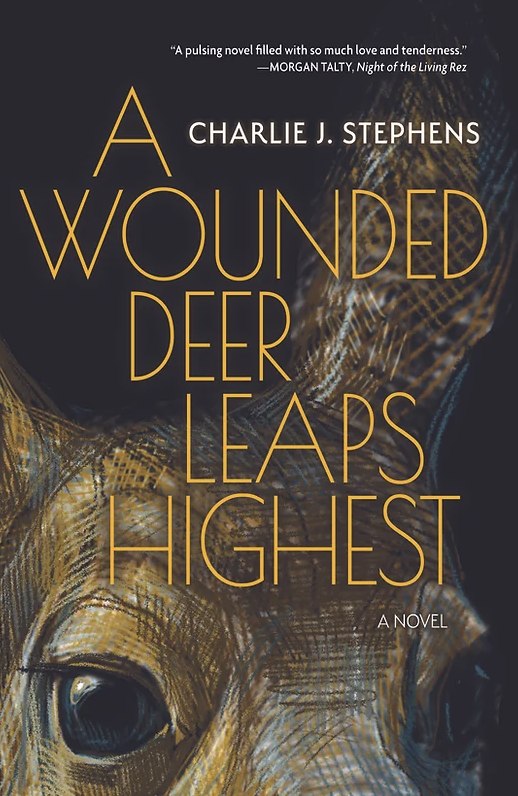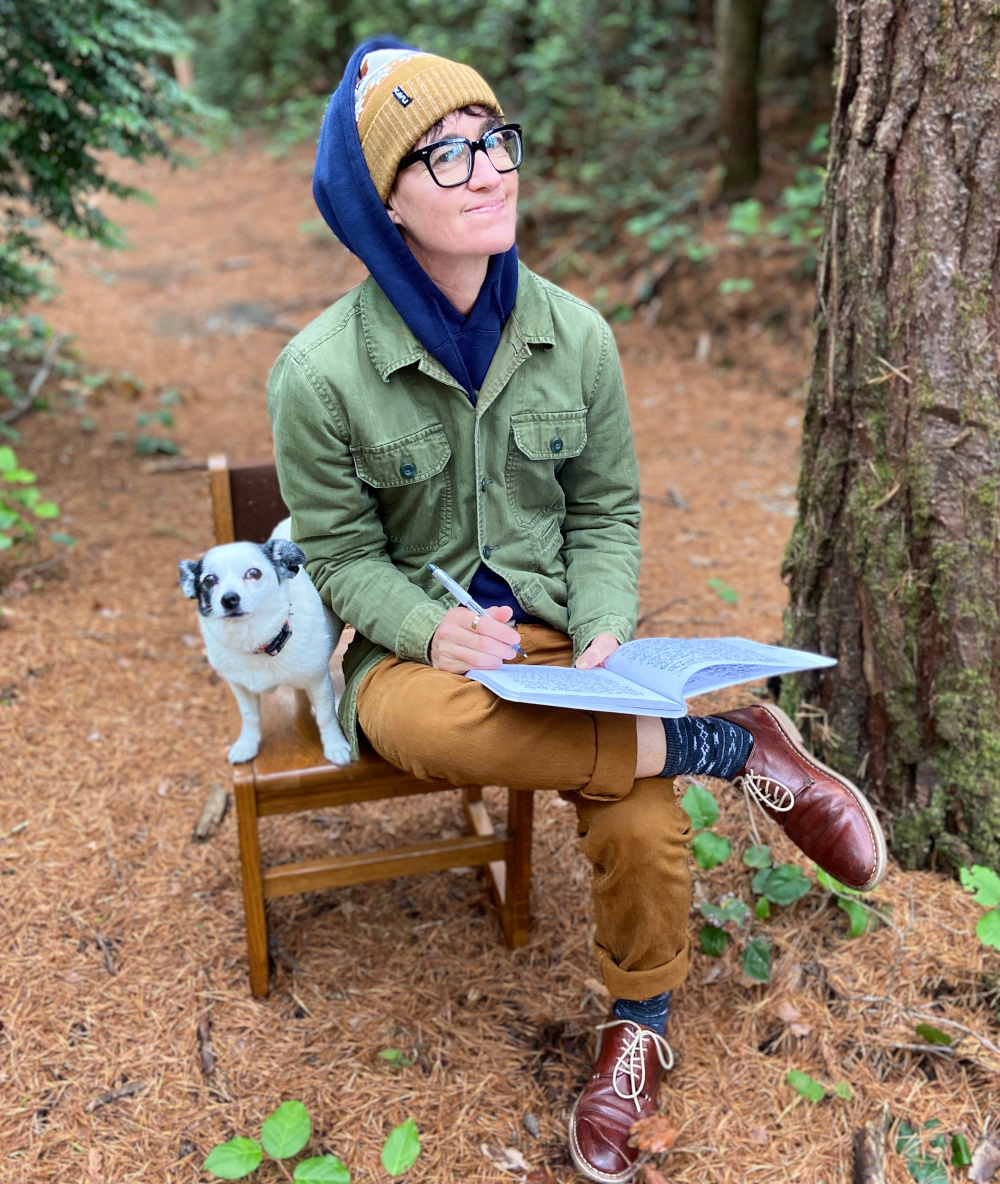Click here to return to the world eco-fiction series
About the Book
Charlie J. Stephens‘ A Wounded Deer Leaps Highest came out by Torrey House Press this April.
In 1980’s Oregon, Smokey is figuring out how to survive childhood with a young mom who is increasingly desperate in her search for love. As their mother’s boyfriends come and go, Smokey aches for the comfort and safety their mother can never quite provide. When a dangerous new man moves into the house, Smokey seeks refuge in the nearby forests–finding comfort as they give themselves over to the strength and beauty of the natural world.
Stephens reveals a secret and unseen world, sensitized to the dark magic of poverty and neglect in woodlands, where being othered is at once the cage and the key.
-Jonathon T. Bailey, author of When I Was Red Clay
A Wounded Deer Leaps Highest is a vivid and compelling novel that captures the lush and dark landscape of Oregon and the sharp edges of a young person’s will to survive poverty and violence. Charlie J. Stephens has carved their story into my memory with their exquisite and shocking prose. I couldn’t look away. Theirs is a story I’ll not soon forget.
-Chelsia Rice, bookseller at Montana Book Company
Chat with the Author
Mary: Thanks so much for your time, Charlie. Your debut novel is out, A Wounded Deer Leaps Highest. How did you dream up this story?
Charlie: The novel started out as a short story called Willamette that I worked on for almost eight years. I didn’t have any plans to have it published, but it was a story I really enjoyed working on. Somehow, even though I kept at it for so long, it never really got any longer, just more solid in a way. When I was finished I did decide to send it out and it was picked up by Peculiar Journal. I thought that would be the end of it, but I kept coming back to those characters and couldn’t quite shake them. I was encouraged to keep going, particularly in workshops I took with Pam Houston’s Writing by Writers, and from there the story pretty quickly developed into the novel that is now A Wounded Deer Leaps Highest.
Mary: The poem by Emily Dickinson is at the start of the novel. What do you get from that poem, and how does it relate?
Charlie: I stumbled across that poem a long time ago and have probably read it hundreds of times at this point. The title of that poem also makes me think of Frida Kahlo’s “Wounded Deer” self-portrait. I like considering the idea of how sometimes when we are in pain we are most alive, or at least our most human, and the idea that vibrancy can come from struggle or perhaps even the nearness of death. I think, overall, the poem has stuck with me because it brings up such visceral images of suffering and brilliance.
Mary: Can you describe what’s going on in the novel?
Charlie: In the novel, Smokey is a nonbinary child growing up in a complicated household in the 1980s in Oregon. They long for the love and attention of their mother, which they sometimes receive but just as often don’t. The mother is struggling with working-class realities and her own loneliness. She tries to get her emotional needs met from various men she brings home who are mostly not capable of being trustworthy or kind and are largely quite abusive. In a way, everyone in the novel is struggling with their own complex set of traumas. Smokey increasingly turns to the natural world for solace, comfort, and love.
Mary: Smokey, the narrator and a child, is nonbinary and mixed race, and they are going through a difficult time. How did you build this character?
Charlie: When I looked around at the literature available, I noticed there weren’t very many nonbinary characters written by nonbinary authors, and it felt important to me to attempt to contribute that. I’ve worked with children and young adults throughout my life as a teacher, group leader, and facilitator and what I noticed, regardless of the school or situation, was that young people really aren’t given enough credit for being, I think, such intensely aware and observant people. They are so capable of processing, understanding and making meaning way more than adults give them credit for. So it also felt important to me that Smokey is shown as being highly aware, sensitive, and possessing a burgeoning selfhood.
Mary: The healing power of nature is a strong affirming value in this novel, which is something Dragonfly often focuses on—the power of nature in literature. What are some of your own experiences in nature that inspired this story?
Charlie: I feel very lucky to have grown up with my mom and grandma, who taught me to be considerate to all living creatures and to find delight and awe in the natural world. When she was still living, my grandma was an amazing gardener, birdwatcher, traveler, and explorer of the West. She delighted in new experiences, and her connection to plants and animals was very strong. My mom also loves these things, and at age 73 still goes camping on her own at least once a month, can recognize animal tracks in the wild, and is way better at identifying birds by their call than my fancy iphone app. They are both amazing people who gave me the gift of feeling incredibly connected with the natural world and its inhabitants.
Mary: I love that! Do you have anything else to add?
Charlie: I hope that in these very difficult times—when climate collapse is happening right before our eyes and terrifying legislation that criminalizes gender-affirming care for young people is being moved through the government—that Smokey and the wilderness they inhabit might in some small way encourage us adults to be our very best selves. There are so many Smokeys in the world and they need us, as do the deer, trees, owls, raccoons, insects, and wild lands that I believe are essential to our sustenance and humanity.
Mary: I agree 100%. Thanks so much for talking about A Wounded Deer Leaps Highest.
About the Author
Charlie J. Stephens is a queer, non-binary, mixed-race writer from the Pacific Northwest. Born and raised in Salem, Oregon, Charlie has lived all over the U.S. as a bike messenger, wilderness guide, high school English teacher, and seasonal shark diver (for educational purposes only.) Resident of Port Orford on the southern Oregon coast, they are the owner of Sea Wolf Books & Community Writing Center. Charlie’s short fiction has appeared in Electric Literature, Best Small Fictions Anthology, New World Writing, Original Plumbing/Feminist Press, and elsewhere. Their debut novel, A Wounded Deer Leaps Highest, was published by Torrey House Press in April 2024.

